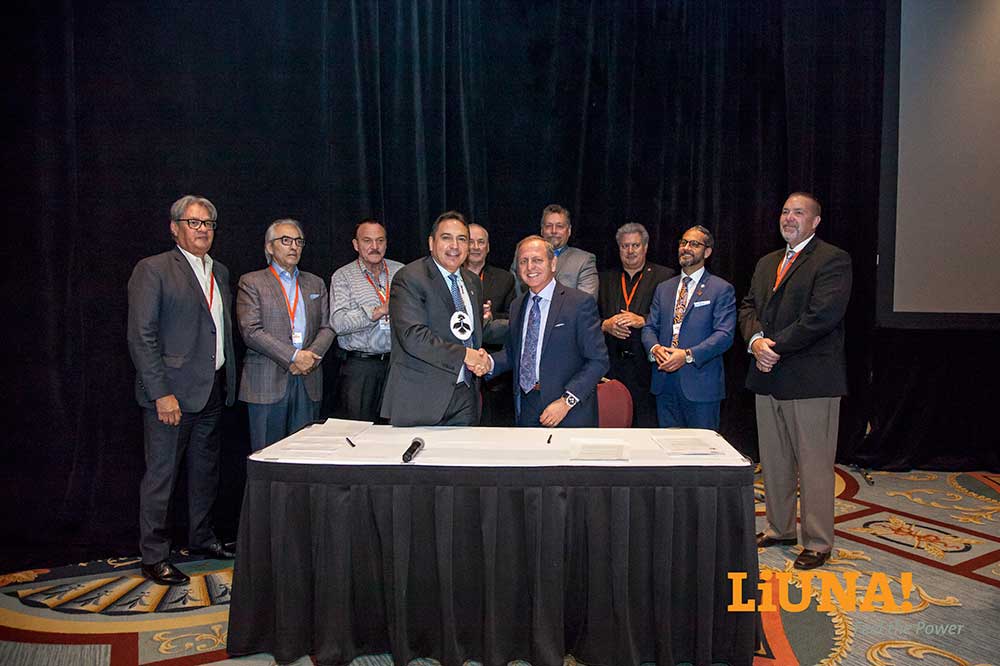Positive, Proactive and Progressive
By Anna Guy
The Labourers’ International Union of North America (LiUNA) claims it is the most progressive, aggressive and fastest growing union of construction workers, representing workers in the industrial, health care, and services sectors of the economy—and they are putting their money where their mouth is.
 If you aren’t one of the over one hundred thousand Canadian members and retirees who have benefitted from LiUNA’s collective bargaining agreements, here’s some background on the organization. LiUNA was established in 1903 and has grown to every major city across North America. LiUNA members build the bridges, highways, dams, hospitals, schools of this country. LiUNA members have not only built this country, but as a major force in the middle class, they have helped sustain it.
If you aren’t one of the over one hundred thousand Canadian members and retirees who have benefitted from LiUNA’s collective bargaining agreements, here’s some background on the organization. LiUNA was established in 1903 and has grown to every major city across North America. LiUNA members build the bridges, highways, dams, hospitals, schools of this country. LiUNA members have not only built this country, but as a major force in the middle class, they have helped sustain it.
Founded on a welcoming and protective union for marginalized communities, specifically providing training and job protection for the many immigrant workers who came to Canada in the 20th century, LiUNA fights for collective bargaining rights, to build a modern infrastructure that keeps Canada competitive and creates jobs, to strive for a sound pension system and healthcare benefits, to stand up for laws that acknowledge the contributions of immigrants, and to make international trade fair.
LiUNA members have the qualification and expertise to make our Canadian cities some of the best places to live and work in the world. Through its training centres, LiUNA members are provided with comprehensive training programs and access to the latest technologies and methods of training delivery. Much of the training is done simulating a realistic construction sector setting to ensure each individual worker is competent, productive, and understands the importance of health and safety on and off the job-site. This is in part why LiUNA has one of the strongest reputations in the construction industry.
“With our many signatories throughout Canada, in all the different sectors, calls go out daily for new jobs an d more work. Our members can work nation-wide, and our benefits transfer,” says Larry Villeneuve, Indigenous Training Liaison. “We have always acted as advocate for workers and their families through the labor force. We will always find new initiatives that benefit our members first and foremost.”
In the 20th Century, many immigrants found fair working conditions and pay through protection with LiUNA. The association makes it very clear that fairness for the working people, regardless of colour, gender, race or ethnicity, no matter our country of origin is the priority. LiNUA has a proud legacy of helping and rewarding marginalized groups, helping employers succeed based on providing the highest quality of work in the world and by being responsible members of our communities.
Statement of Partnership
In the 2000s, that commitment has not changed. Recognizing the disparate employment rates of Aboriginals compared to the rest of Canada, LiUNA has committed to doing its part to help reverse this trend of lower employment rates and higher poverty levels Aboriginal communities.
In June, 2017, LiUNA and the Assembly of First Nations signed a Statement of Partnership at the LiUNA Canadian Conference affirming LiUNA’s commitment in support of the findings of the Truth and Reconciliation Commission, the UN Declaration for Indigenous People and education and training of First Nations communities. “The century old struggles of the indigenous communities across Canada have for hundreds of years sought to be treated as equal and LiUNA strongly believes that together we can build a strong partnership with an emphasis on training and education as youth are the future builders of our growing economy.” LiUNA International Vice President Joseph Mancinelli said at the time.
Through this statement of partnership, LiUNA has demonstrated its commitment to First Nations and to walking down the path of reconciliation, and represent a model for other organizations in Canada. Aboriginal youth have the fastest growing population in Canada (at 3 per cent national average), and with 50 per cent under age 25, there is a significant opportunity on all sides for long-term employment from a skilled workforce.
The partnership is the culmination of years of work. Initialed in 2007, with Mancinelli and then former Assembly of First Nations Chief Phil Fontaine LiUNA made progress with more with the inclusion of Indigenous groups throughout Canada.
“Since a lot of the work is coming out, we see this opportunity as win-win. Training young Aboriginal youth would be a real plus. A plus for us because we need to replenish the workforce, and a great opportunity to provide jobs to a large, young population,” adds Villeneuve.






